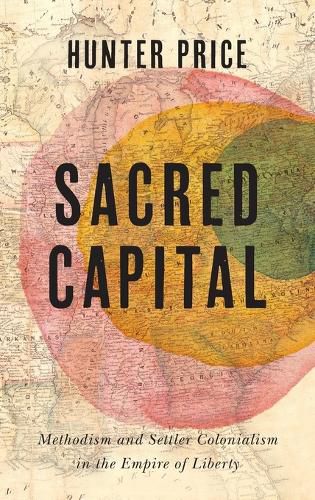Readings Newsletter
Become a Readings Member to make your shopping experience even easier.
Sign in or sign up for free!
You’re not far away from qualifying for FREE standard shipping within Australia
You’ve qualified for FREE standard shipping within Australia
The cart is loading…






How Methodist settlers in the American West acted as agents of empire
In the early years of American independence, Methodism emerged as the new republic's fastest growing religious movement and its largest voluntary association. Following the contours of settler expansion, the Methodist Episcopal Church also quickly became the largest denomination in the early American West. With Sacred Capital, Hunter Price resituates the Methodist Episcopal Church as a settler-colonial institution at the convergence of "the Methodist Age" and Jefferson's "Empire of Liberty."
Price offers a novel interpretation of the Methodist Episcopal Church as a network through which mostly white settlers exchanged news of land and jobs and facilitated financial transactions. Benefiting from Indigenous dispossession and removal policies, settlers made selective, strategic use of the sacred and the secular in their day-to-day interactions to advance themselves and their interests. By analyzing how Methodists acted as settlers while identifying as pilgrims, Price illuminates the ways that ordinary white Americans fulfilled Jefferson's vision of an Empire of Liberty while reinforcing the inequalities at its core.
$9.00 standard shipping within Australia
FREE standard shipping within Australia for orders over $100.00
Express & International shipping calculated at checkout
How Methodist settlers in the American West acted as agents of empire
In the early years of American independence, Methodism emerged as the new republic's fastest growing religious movement and its largest voluntary association. Following the contours of settler expansion, the Methodist Episcopal Church also quickly became the largest denomination in the early American West. With Sacred Capital, Hunter Price resituates the Methodist Episcopal Church as a settler-colonial institution at the convergence of "the Methodist Age" and Jefferson's "Empire of Liberty."
Price offers a novel interpretation of the Methodist Episcopal Church as a network through which mostly white settlers exchanged news of land and jobs and facilitated financial transactions. Benefiting from Indigenous dispossession and removal policies, settlers made selective, strategic use of the sacred and the secular in their day-to-day interactions to advance themselves and their interests. By analyzing how Methodists acted as settlers while identifying as pilgrims, Price illuminates the ways that ordinary white Americans fulfilled Jefferson's vision of an Empire of Liberty while reinforcing the inequalities at its core.